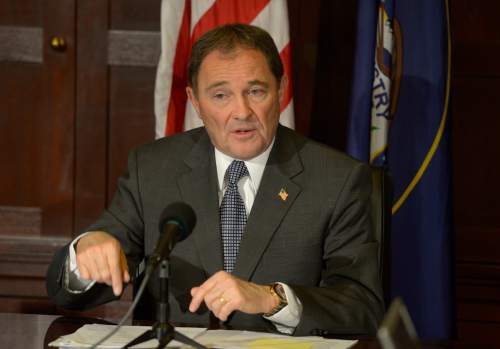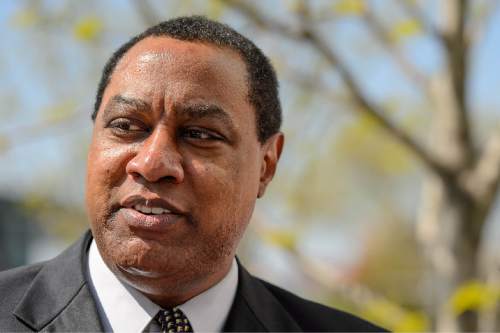This is an archived article that was published on sltrib.com in 2015, and information in the article may be outdated. It is provided only for personal research purposes and may not be reprinted.
Gov. Gary Herbert said Thursday he is confident the Utah Republican Party will do what needs to be done to "come to resolution" over its opposition to changes in the way parties choose political candidates and that there will be GOP candidates on the ballot in 2016.
"I'm sorry to see the divisiveness that has occurred. I'm sorry to see the infighting within the Republican Party," Herbert, a Republican himself, said during his monthly KUED news conference. "I think the courts have spoken. There's not an injunction that has been given. That seems to indicate there isn't any constitutional violation."
Last week, U.S. District Judge David Nuffer rejected the Utah GOP's request that he block implementation of SB54, the new law changing how candidates are picked. Nuffer said the party couldn't show SB54 caused the party irreparable harm — at least not yet — and did not unduly infringe on the party's right to choose candidates as it sees fit.
But party Chairman James Evans has said in a declaration to the court the party can't possibly adopt the new policies for selecting candidates in time to comply with a September deadline to qualify to have candidates on the ballot.
That could mean that, in one of the most Republican states in the country, there may not be any GOP candidates on the ballot in 2016.
SB54 passed last year as a compromise between organizers of the Count My Vote movement, led by former Gov. Mike Leavitt and other prominent Utahns, and legislators on how to nominate candidates.
Count My Vote said the existing nominating process — letting delegates pick candidates at party conventions — disenfranchised a wide swath of mainstream Utahns, drove down voter turnout and produced candidates who are outside the mainstream. The group sought to let candidates who gather signatures from voters get a spot on the primary ballot and then allow voters to decide.
As part of the deal, SB54 lets parties decide if they want to still hold party conventions to pick a candidate to go to the primary against those gathering signatures, or if they simply want to go the signature-gathering route.
Herbert said he has always supported the original party convention process, which he noted allowed him to get where he is today. When he ran for governor, Herbert was a lower-tier candidate, but was chosen to be Jon Huntsman's running mate to shore up his conservative flank going into convention.
But Count My Vote threatened the convention system, so he signed SB54 to try to preserve at least part of the original system.
Herbert did not say whether he would actively push party officials to make the changes needed to comply with SB54.
"Undoubtedly people will ask my opinion and I'll give it, and I expect that will happen in the future," Herbert said. "We'll work it out. I'm confident this will be resolved."
Boyd Matheson, chief of staff to Sen. Mike Lee, said the senator, who will be up for re-election in 2016, shares Herbert's belief the party will do what it takes to get candidates on the ballot.
"Certainty is critical for candidates and campaigns as they begin to create plans, budgets and strategies for 2016. Candidates also need to be certain that if they follow the rules, and otherwise qualify, they will be listed as Republican nominees on the November ballot," Matheson said.
Evans said the GOP's main concern always has been that anybody could run as a Republican without receiving scrutiny from party members. During the recent federal court hearing, however, Nuffer made the point several times that the party has the ability to control its own membership.
"That may be a way we can get a lot of our concerns addressed," Evans said, "and we are exploring that possibility to make sure we continue to properly vet candidates."
Evans said the GOP will hold a special central committee meeting to discuss the options before August's state convention.
In other matters, Herbert urged Utahns to conserve water, noting that the water year has produced about half the precipitation it normally does, which means more than a bad ski year, because snow is needed to fill the state's reservoirs.
"The good news is, because of a wet summer last year, the drawdown on our reservoirs has not been as acute as it would be historically," Herbert said, noting that those lakes are at about the same levels they were a year ago.
"We have to do our part, all of us, to make sure we conserve water," Herbert said, encouraging Utahns to water their lawns sparingly.
He said he believes the climate is changing, although he said it is unclear how much of that is caused by humans.
"For me, [the cause] doesn't matter. We just need to understand that, hey, we're not getting as much snowpack. We ought to do what we can to adjust," Herbert said. The state also should do things to keep the air clean, such as reducing emissions and developing alternative energies, and, if that helps deter climate change, even better, he said.
The governor has had preliminary talks with U.S. Health and Human Services Secretary Sylvia Burwell about allowing the state to cap costs for expanding Medicaid through the governor's Healthy Utah plan to provide health care to the poor, or some other way.
He said he plans to travel to Washington soon to meet with HHS officials to discuss specifics.
Herbert hopes legislative leaders will be able to join him on the trip.
He has had some preliminary discussions about meeting with legislative leaders to try to work toward a compromise on how to get health insurance to the poor after a stalemate in the recent legislative session.
Twitter: @RobertGehrke





